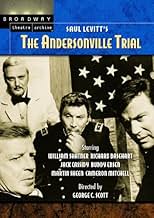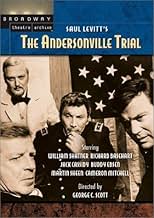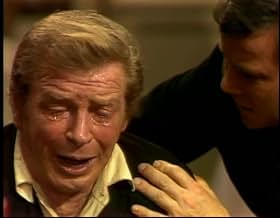Ajouter une intrigue dans votre langueA dramatization of the 1865 war-crimes trial of Henry Wirz, commandant of the notorious Confederate POW camp at Andersonville, Georgia.A dramatization of the 1865 war-crimes trial of Henry Wirz, commandant of the notorious Confederate POW camp at Andersonville, Georgia.A dramatization of the 1865 war-crimes trial of Henry Wirz, commandant of the notorious Confederate POW camp at Andersonville, Georgia.
- Réalisation
- Scénario
- Casting principal
- Récompensé par 3 Primetime Emmys
- 4 victoires et 2 nominations au total
Dal McKennon
- First Guard
- (as Dallas McKennon)
William Bryant
- The Lieutenant
- (as Bill Bryant)
Avis à la une
As with many of you, it has been over thirty years since I have seen this on PBS. It stirred me then so much, I watched it again in close rerun cycle. I have often wished it was available on video, but never saw it, though it recently showed up at the head of someone's snarky list of Civil War themed movies. That got me thinking and sent me here, where I noticed many were still bemoaning the lack of a video. Well, Amazon.com lists it as having been released on video in 1991. Yay! That source does indicate both "out of stock" and "15 new or used copies available." You may have to actually place an order to find out which is true. Anyway, be of good cheer, comrades. It's out there somewhere!
I agree with all the positive comments, including those rating Shatner's performance as the prosecuting judge advocate. That he was directed by the man who debuted the role on Broadway was a sweet good fortune. I'd read an article in Playboy about George C. Scott around that same time, in which the author described being on the set with Scott coaching Shatner through a particularly dramatic scene, crouched down and gesturing with him, and both described as "baby bulls." I would love to have been a fly on the wall during some of the rehearsals and script sessions! Helluva show.
I agree with all the positive comments, including those rating Shatner's performance as the prosecuting judge advocate. That he was directed by the man who debuted the role on Broadway was a sweet good fortune. I'd read an article in Playboy about George C. Scott around that same time, in which the author described being on the set with Scott coaching Shatner through a particularly dramatic scene, crouched down and gesturing with him, and both described as "baby bulls." I would love to have been a fly on the wall during some of the rehearsals and script sessions! Helluva show.
This greater than two-hour drama recreates the trial of Henry Wirz, commandant of the Confederate POW camp at Andersonville, Georgia. It has an amazing cast of prominent stars of the time, some of whom are quite recognizable, such as Alan Hale as a member of the jury who doesn't even have any lines, and relatively unknown at the time, Charlie Sheen, who only has one line as a soldier.
William Shatner has the largest role as prosecutor and, contrary to his general reputation, does not over-emote but instead pretty much nails the role. He struggles with duty versus conscience, as the crux of his moral argument is that Wirz should have disobeyed direct orders and done more to care for the prisoners in his charge, but then no military tribunal of the time would agree that it is ever acceptable to disobey orders and it would be career suicide to directly argue such a thing. Wirz is played by Richard Basehart, who I've always found to be an underrated actor. Jack Cassidy is the attorney for the defense, Otis Baker, who is a Confederate sympathizer and wishes to point out the hypocrisy of the situation - Confederate prisoners under the care of the Union died in terrible circumstances as well - but he gets shut down by the judge in the situation, played by Cameron Mitchell, who is bombastic in temperament but fair.
The entire play is set inside the courtroom, lasts two and a half hours, and besides being a showcase of very good acting and instructive on Civil War history, it indicates how much longer of an attention span audiences must have had 55 years ago. Public TV would never attempt something of this length in this format today.
George C. Scott, the director, got a very authentic performance out of William Shatner, who could ordinarily be quite stiff. In retrospect, perhaps Scott should have directed a few episodes of Star Trek.
William Shatner has the largest role as prosecutor and, contrary to his general reputation, does not over-emote but instead pretty much nails the role. He struggles with duty versus conscience, as the crux of his moral argument is that Wirz should have disobeyed direct orders and done more to care for the prisoners in his charge, but then no military tribunal of the time would agree that it is ever acceptable to disobey orders and it would be career suicide to directly argue such a thing. Wirz is played by Richard Basehart, who I've always found to be an underrated actor. Jack Cassidy is the attorney for the defense, Otis Baker, who is a Confederate sympathizer and wishes to point out the hypocrisy of the situation - Confederate prisoners under the care of the Union died in terrible circumstances as well - but he gets shut down by the judge in the situation, played by Cameron Mitchell, who is bombastic in temperament but fair.
The entire play is set inside the courtroom, lasts two and a half hours, and besides being a showcase of very good acting and instructive on Civil War history, it indicates how much longer of an attention span audiences must have had 55 years ago. Public TV would never attempt something of this length in this format today.
George C. Scott, the director, got a very authentic performance out of William Shatner, who could ordinarily be quite stiff. In retrospect, perhaps Scott should have directed a few episodes of Star Trek.
This is one of those rare presentations that one remembers, not only the content, but also the feelings and thoughts that it evoked, even decades after viewing. This is the very best courtroom drama I have ever seen. The captains of the Enterprise and whatever the name of the sub was on Voyage to the Bottom of the Sea (Shatner and Basehart) show what they were capable of doing with first-rate material and direction. Set aside some uninterrupted time to see this one.
A wonderful TV movie about the most notorious of the "concentration camps" of the American Civil War. It has a first-rate cast, with Richard Basehart giving an especially intense performance as the camp commandant. I hope some day it comes out on video or is rebroadcast, perhaps by the History Channel.
I watched this on TV when I was 13 or 14 yrs old and was engrossed in it. It left a lasting impression on me. Even to this day, I still think about it. As a kid, I couldn't have told you if the acting was first rate. Evidently it was; I do remember thinking the actors presented it as if the story had happened to them. I also remember being aware that William Shatner was remarkably restrained in this role and thinking how convincing he was.
I can't say this particular movie sparked my interest in American history, but it certainly looms large. Even if the story has been "Hollywood-ized" with the addition of bogus testimony of the camp commandant, the rest of the story is quite true. The sad story of Civil War POW's at Camp Sumter (the actual name of the prison) should be studied by all, not just students of American history. Incidentally, the Andersonville National Historic Site (outside of Richmond, VA) is the only national park that serves as a memorial for ALL American POW's. Because of having seen this movie, I sought out more info about the actual place and actual facts. This doesn't necessarily prove it's a well made movie, but it's the highest compliment I can pay to The Andersonville Trial.
To me, the time invested in watching this movie is worth it.
I can't say this particular movie sparked my interest in American history, but it certainly looms large. Even if the story has been "Hollywood-ized" with the addition of bogus testimony of the camp commandant, the rest of the story is quite true. The sad story of Civil War POW's at Camp Sumter (the actual name of the prison) should be studied by all, not just students of American history. Incidentally, the Andersonville National Historic Site (outside of Richmond, VA) is the only national park that serves as a memorial for ALL American POW's. Because of having seen this movie, I sought out more info about the actual place and actual facts. This doesn't necessarily prove it's a well made movie, but it's the highest compliment I can pay to The Andersonville Trial.
To me, the time invested in watching this movie is worth it.
Le saviez-vous
- AnecdotesAll of the witnesses as portrayed in the film are the actual witnesses who testified at Wirz's trial, and their dialogue in many cases is taken almost verbatim from the trial transcript. The major change from history is that Wirz did not testify and the whole "moral issue", around which this film revolves, was never raised at the trial.
- GaffesEarly on, a captain played by Martin Sheen comes into the court to tell Gen. Wallace that the defendant tried to hurt himself. The crossed sabers insignia of the cavalry on Sheen's cap is upside down.
- ConnexionsFeatured in The 23rd Annual Primetime Emmy Awards (1971)
Meilleurs choix
Connectez-vous pour évaluer et suivre la liste de favoris afin de recevoir des recommandations personnalisées
Détails
Contribuer à cette page
Suggérer une modification ou ajouter du contenu manquant





































